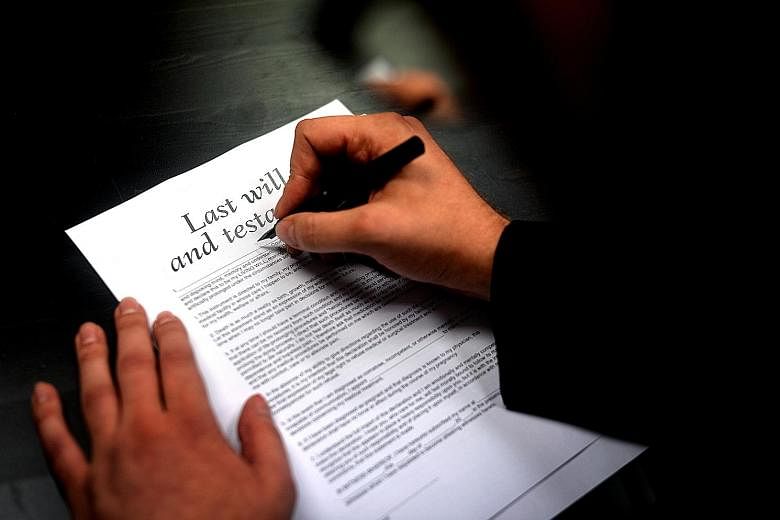The dispute over a will left by former prime minister Lee Kuan Yew has thrown the spotlight on a legal document, and process, that some in Singapore still consider taboo.
Lawyers and firms involved in will writing say only a small proportion of Singaporeans have done up wills to ensure their property is distributed according to the wishes they hold when they are still alive.
Mr Linus Wong, director of local estate-planning firm Bequest, estimates that no more than 10 to 15 per cent of Singaporeans have made wills. This contrasts with a figure of more than 40 per cent in the United Kingdom.
The UK also has an Institute of Professional Willwriters. No such institution exists in Singapore.
Mr Wong's firm is involved in will writing, Lasting Power of Attorney and Advanced Medical Directives in Singapore.
He said the bulk of his clients are white-collar professionals in their 40s or 50s who take their parents to make wills and subsequently do so themselves.
Mr Dennis Loh, managing partner of local law firm Chiu Cheong, said some people think it is costly to get a will made, time-consuming and that all assets must be listed. Older people also consider it taboo to discuss death, he added.
Mr Marcus Heng, 47, had updated his will twice, once after his second marriage and again after his younger daughter Leona was born with Edwards syndrome, a rare genetic disorder that leads to heart defects, growth deficiencies and intellectual disability.
The most recent change was to include a clause that when he dies, Leona would be taken care of by a trust he had set up with the Special Needs Trust Company, a charity providing trust services to special-needs individuals.
"I realised that a will is very important because it will protect your family and avoid disputes," said Mr Heng, who runs a training and consultancy business.
-
Recent disputes over wills
2017: 38, Oxley Road dispute. Former prime minister Lee Kuan Yew's three children disagree on the interpretation of his wishes for demolition of the residence.The matter is now being handled among the children privately.
2016: Yeo Hiap Seng family. Two grandchildren of one of the founding directors of the food and beverage company went to court to try to overturn the validity of the latest version of their mother's will, but failed. Previous wills had left two houses to them.
2015: Holland Avenue flat. The grandchildren of one of Madam Ching Choong Hwa's dead children went to court to dispute a will, and won. It involved a four-room flat which her remaining two children sold and divided the money between themselves.
What is a will and how does it work?
A will is a legal document that details a testator's wishes relating to the distribution of his property and care of minors after death.
The testator must be at least 21 and the will must be signed by at least two witnesses, who cannot be beneficiaries or spouses.
The help of a lawyer is not needed, but will make it easier to comply with administrative requirements.
Executors need to be appointed to administer the estate. They can be relatives, friends or professional executors.
Information about the will, such as the details of the person making the will, can be deposited in the confidential Wills Registry, which will facilitate its administration after death.
The registry charges a small fee for deposition. The registry is maintained by the Public Trustee's Office at the Ministry of Law.
When a person dies without a will and leaves behind multiple potential beneficiaries, the court will need to work out who gets what according to the Intestate Succession Act, depending on which family relations are still alive, leading to high legal fees.
Mr Wong said many who walk into his office did not know it was so complicated, or thought there was some government department to take care of it.
"Without a will, you're adding layers of trouble to an already very troublesome process."
Others rely on alternatives.
Retiree Thomas Abraham, 65, whose wife co-owns their Housing Board flat in Pasir Ris, signed up for the CPF Nomination Scheme in which his wife will get 50 per cent of his CPF savings and his two children - a son and a daughter - will get 25 per cent each. When he dies, she gets the flat.
Madam Phyllis Peh, 55, began to reorganise her family's finances soon after her husband Michael Ong was diagnosed with stage 4 colon cancer in May last year.
Although Mr Ong has no will, he jointly owns the flat with his wife, which she will get, and they recently transferred the ownership of their car to their only daughter.
Madam Peh said she was considering making her own will, to ensure that her estate would go to her daughter, their only child, and no one else. "You should do it earlier while you are of sound mind."
Wills are not limited to the people who hold millions.
Mr Wong has one client who attached all her culinary recipes to the will, and another who stipulated that his vintage car with a special licence plate number must not be sold for less than $300,000.
He also sees clients in their 20s who have been posted by their employers to high-risk assignments overseas.
"People today are wealthier and have fewer children compared with 15 years ago... There is increasing concern about where their money goes," added Mr Wong.
SEE INVEST


